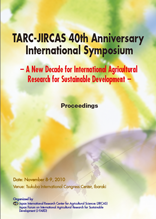A Vision for Global Agricultural, Food and Environmental Challenges

To address the challenges facing global agriculture today by working toward poverty
alleviation, using science to benefit development, and developing policies and policy tools for
decision??makers, CIRAD has adapted its scientific and partnership strategy.
CIRAD’s mandate is to pursue research, education and dissemination of knowledge and
research results. Its activities involve the life sciences, social sciences and engineering sciences,
applied to agriculture, forestry, animal production and health, food, environmental issues, and rural
territories. CIRAD works in collaboration with other French institutions, European research groups,
and many other national and international partners, from South and North regions.
CIRAD’s experience on-the-ground, some dating back to the 1950s, is an essential part of its
history and capacities. This has allowed it to collect a large set of scientific and empirical data and to
gather a specific expertise to compare various ecosystems, agricultural practices and social issues. A
growing range of partners, including universities, farmers and producers organizations, NGOs,
businesses, governments, and regional and global entities (such as NEPAD and the CGIAR) help
CIRAD to continuously develop its vision for agricultural research.
CIRAD carries out its research through partnership in South and North regions. All
partnerships must satisfy the principle of generating shared scientific knowledge. Some national
research partners require support to carry out their priority objectives. Others have achieved a level of
quality that meets international standards. By building research programs jointly with a range of
partners, and developing and sharing the results (publications, innovations, patents, and any products
obtained), CIRAD contributes to capacity building which benefits both its partners and itself.
CIRAD has developed a number of tools to assist its work. These include the research and
education platforms which it develops and shares with its partners, and decision tools and scenario
systems such as Agrimonde (forecasting and studying global food issues to the year 2050), and the
OAM (Observatory of world agricultures) which encourage information gathering at many levels, and
permit comparisons across countries and regions.
SIX PRIORITY LINES
Global agriculture now faces three seemingly contradictory concerns: feeding the world,
ensuring energy production, and preserving the environment. To address today’s challenges using
agricultural research, CIRAD’s activities concentrate along six critical, priority lines:
?? Ecological intensification;
?? Biomass energy and societies in the South;?? Accessible, quality food;
?? Animal health and emerging diseases;
?? Public policy, poverty and inequality;
?? Agriculture, environment, nature and societies.
PRIORITY RESEARCH AND EDUCATION INITIATIVES IN PARTNERSHIP
To maintain a high-level scientific output, and strengthen ties between research, universities
and local practices, CIRAD is focusing its efforts through some priority initiatives around the world.
These priority research and education platforms permit CIRAD to concentrate its resources,
provide focal points for advanced and adaptive research, and help train researchers and development
actors.
| Date of issued | |
|---|---|
| Creator | Christian Hoste |
| Publisher | Japan International Research Center for Agricultural Sciences |
| Available Online | |
| Issue | 2010 |
| spage | 51 |
| epage | 58 |
| Rights | Japan International Research Center for Agricultural Sciences |
| Language | eng |
